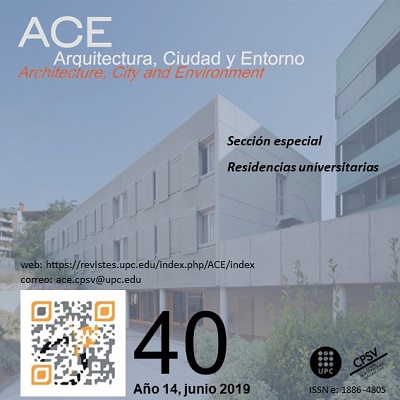Previous Experience and Normative Requirements as Principles of German Modern Housing
DOI:
https://doi.org/10.5821/ace.14.40.5699Keywords:
modern housing, small dwelling, German urban planning, Prussian Housing LawAbstract
Objective
This article addresses two important issues in the configuration of modern German housing in the third decade of the twentieth century, that allows for an understanding into the transformation that takes place in housing and in the city at that time, as a result of a rooted collective desire, and not only as a consequence of the action of a specific avant-garde.
Methodology
On one hand, it deals with the influence of the housing reformist proposals built in the second half of the nineteenth century, which as a conflicting solution to the unhealthy characteristics of the dense and deep block, provide an alternative experience that turns the linear and double-bay building into a desired model. On the other, it deals with the consequences this flowing for desired change to the 1st legislation in German housing had on the built forms. By studying original documents from that time both aspects are related to outstanding proposals of modern German accommodation.
Conclusions
These two issues will be essential for the generalization of the new type of living space and influence the global character of the urban transformation that takes place in the German territory in that decade.
Originality
Influences that have been under-valued in the most extensive history of modern German housing are studied, whose relevance, nevertheless, are made evident from the research of original sources. The translations of the cited texts were done by the author and present interesting ideas from its protagonists that have rarely been released.
Downloads
Published
Issue
Section
License
| INTELECTUAL PROTECTION CRITERIA |
At this moment, it is count with the "Oficina Española de Patentes y Marcas", while global protection it is being processed by the World Intelectual Property Organization (OMPI/WIPO). Nevertheless the International Standard Serial Number Office (ISSN) has given the following numbers ISSN: 1886-4805 (electronic version) and 1887-7052 (paper version). All articles will be peer reviewed, using double blind reviewing. |
| COPYRIGHT |
The article contents and their comments are authors exclusive liability, and do not reflect necessarily the journal editor commitee's opinion. All ACE published works are subject to the following licence CC BY-NC-ND 3.0 ES http://creativecommons.org/licenses/by-nc-nd/3.0/es/ It implies that authors do not hold nor retain the copyright without restrictions but only those included in the licence. |





































